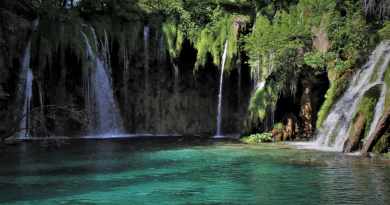What is ecotourism? What is sustainable tourism?
James Cortez is an independent travel writer, based in Cannes
What is ecotourism? How does it work? Why does it matter? And how can we, as travellers, put the core principles of ecotourism into practice? In recent years, the growth of interest in responsible travel has outpaced that of traditional sun/sand tourism by an increasingly wide margin.
With ecotourism increasing its share of consumer spending, these sorts of questions have become more and more common. And, as we continue to see more negative impacts of mass tourism on beloved destinations around the world, the answers to these questions will become increasingly vital.
Part of the confusion surrounding sustainable travel is the plethora of names being used for it within the industry.
Ecotourism is the oldest and most commonly used word for it. More recent industry buzzwords include sustainable tourism, green tourism, nature tourism, responsible tourism, ethical tourism, mindful travel, conscious travel, pro-poor tourism, and many others.
Regardless of what you call it, the central concepts that these philosophies share in common are that the travel industry as a whole should adopt more environmentally friendly practices, protect the natural and cultural heritage of a destination, and support local communities.
Post-COVID, travel won’t be the same as it once was, and it seems like a good time to deepen the conversation about what ecotourism is and why it’s important for the future of travel.
The definition of ecotourism
Ecotourism is a form of tourism involving responsible travel (using sustainable transport) to natural areas, conserving the environment, and improving the well-being of the local people. Its purpose may be to educate the traveller, to provide funds for ecological conservation, to directly benefit the economic development and political empowerment of local communities, or to foster respect for different cultures and for human rights.
Since the 1980s, ecotourism has been considered a critical endeavour by environmentalists, so that future generations may experience destinations relatively untouched by human intervention. Ecotourism may focus on educating travellers on local environments and natural surroundings with an eye to ecological conservation. Some include in the definition of ecotourism the effort to produce economic opportunities that make conservation of natural resources financially possible.
Generally, ecotourism deals with interaction with biotic components of the natural environments. Ecotourism focuses on socially responsible travel, personal growth, and environmental sustainability. Ecotourism typically involves travel to destinations where flora, fauna, and cultural heritage are the primary attractions. Ecotourism is intended to offer tourists an insight into the impact of human beings on the environment and to foster a greater appreciation of our natural habitats.
Ecotourism aims at minimal environmental impact on the areas visited. Besides fostering respect towards the natural environment, ecotourism also helps in creating socio-economic benefits for the communities of the area visited.
Responsible ecotourism programs include those that minimize the negative aspects of conventional tourism on the environment and enhance the cultural integrity of local people. Therefore, in addition to evaluating environmental and cultural factors, an integral part of ecotourism is the promotion of recycling, energy efficiency, water conservation, and creation of economic opportunities for local communities. For these reasons, ecotourism often appeals to advocates of environmental and social responsibility.
Sustainable tourism is a concept that covers the complete tourism experience, including concern for economic, social and environmental issues as well as attention to improving tourists’ experiences and addressing the needs of host communities
Benefits
Ecotourism is tourism which is conducted responsibly to conserve the environment and sustain the well-being of local people. Its benefits include:
~Building environmental awareness.
~Providing direct financial benefits for conservation.
~Providing financial benefits and empowerment for local people.
~Respecting local culture.
~Supporting human rights and democratic movements such as:
~conservation of biological diversity and cultural diversity through ecosystem protection.
~promotion of sustainable use of biodiversity, by providing jobs to local populations.
~sharing of all socio-economic benefits with local communities and indigenous peoples by having their informed consent and participation in the management of ecotourism enterprises.
~tourism to unspoiled natural resources, with minimal impact on the environment being a primary concern.
~minimisation of tourism’s own environmental impact.
~affordability and lack of waste in the form of luxury.
~local culture, flora, and fauna being the main attractions.
~local people, who benefit from this form of tourism economically, and often more than mass tourism.
Ecosystem protection can occur as ecotourism can help the funding of the operation of protected areas (ie. national parks) Protected areas such as national parks often need to employ (and pay for) park rangers, and if Safari lodges are foreseen, staff is needed for this as well.
For many countries, ecotourism is not simply a marginal activity to finance protection of the environment, but a major industry of the national economy. For example, in Costa Rica, Ecuador, Nepal, Kenya, Madagascar and territories such as Antarctica, ecotourism represents a significant portion of the gross domestic product and economic activity.
Sustainable tourism
Sustainable tourism is a concept that covers the complete tourism experience, including concern for economic, social and environmental issues as well as attention to improving tourists’ experiences and addressing the needs of host communities.
Sustainable tourism should embrace concerns for environmental protection, social equity, and the quality of life, cultural diversity, and a dynamic, viable economy delivering jobs and prosperity for all. It has its roots in sustainable development and there can be some confusion as to what ‘sustainable tourism’ means. There is now broad consensus that tourism should be sustainable.
In fact, all forms of tourism have the potential to be sustainable if planned, developed and managed properly. Tourist development organisations are promoting sustainable tourism practices in order to mitigate negative effects caused by the growing impact of tourism, for example its environmental impacts.
The United Nations World Tourism Organization emphasized these practices by promoting sustainable tourism as part of the Sustainable Development Goals, through programs like the International Year for Sustainable Tourism for Development in 2017. There is a direct link between sustainable tourism and several of the 17 Sustainable Development Goals (SDGs). Tourism for SDGs focuses on how SDG 8 (‘decent work and economic growth’), SDG 12 (‘responsible consumption and production’) and SDG 14 (‘life below water’) implicate tourism in creating a sustainable economy. Improvements are expected to be gained from suitable management aspects and including sustainable tourism as part of a broader sustainable development strategy.




